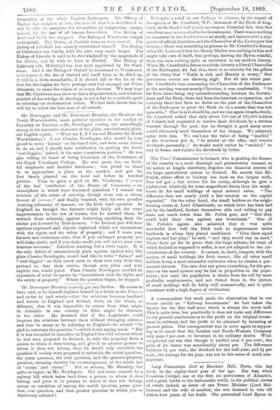The Times' Commissioner in Ireland, who is probing the disease
of the country in a most thorough and praiseworthy manner, as we notice at length elsewhere, disputes the financial success of the large agricultural system in Ireland. He asserts that Mr. Pollok, whose effort in Galway has been on the largest scale, does not get a fair return for his outlay, although he gets a higher rent relatively for some magnificent farms than his neigh- bours do for small holdings of equal natural value. " The difference does not nearly yield a fair interest on the capital expended." On the other hand, the small holders on the neigh- bouring estate of Lord Clanricarde, on which little has been laid out by the landlord, declare themselves able and willing to pay rents not much lower than Mr. Pollok gets, and " that they could hold their own against any Scotchman." One of Mr. Pollok's agents also admitted that it was quite wonderful how well the Irish took to improvement under landlords in whom they placed confidence. " Give them equal capitals and fair play," he said, " and they would run us hard." These facts go far to prove that the large culture, for want of which Ireland is supposed to suffer, is not yet adapted to the cir- cumstances of the country. It cannot, in short, compete with the system of small holdings, the Irish tenant, like all other small holders, being a most successful cultivator when he obtains a per- manent interest. The case does not prove everything, for the pro- duce on the small system may be less in proportion to the popu- lation ; but until the population is drawn from the soil by more profitable employments, and not forced from it, the system of small holdings will do fairly well economically, and is quite consistent with a high degree of civilization.






























 Previous page
Previous page